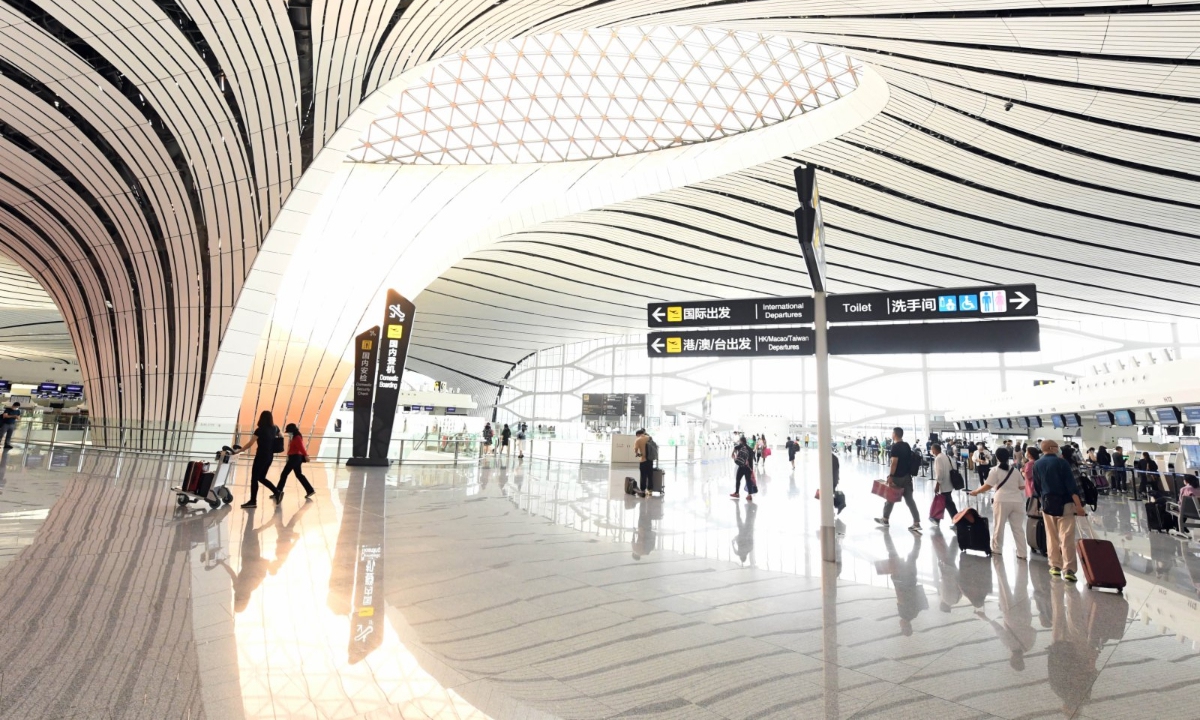
Beijing Daxing International Airport Photo: Xinhua
After Chinese authorities on Monday night announced the lifting of quarantine requirement for international travel starting in early January, searches and bookings for international flights and hotels rocketed on multiple Chinese online travel agencies, with some numbers hitting three-year highs.
Given the great enthusiasm of Chinese travelers after three years of limited outbound trips due to the pandemic, tourism industry insiders are expecting a surge in outbound travel during the upcoming Spring Festival holidays and a more pronounced rebound during the May Day holidays.
"Customers who came to consult us about outbound travel totaled four or five times that of normal days," Jia Jianqiang, CEO of 6renyou, an online tourism agency in Beijing, told the Global Times on Tuesday, noting that neighboring Southeast Asian countries are popular destinations.
Jia predicted that the Spring Festival holidays will be the first travel peak, for there are about 20 days left for people make visa preparations.
Xu Xiaolei, marketing manager at China's CYTS Tours, also expected a fast recovery during the Spring Festival holidays, but "the May Day holidays and summer vacation period will see significant growth for outbound tourism, and it may even exceed the normal level of outbound tourism before the pandemic in 2019."
Data from aviation data provider VariFlight showed that as of 10 am on Tuesday, the search volume for international air tickets during the Spring Festival holidays had tripled, and that of the May Day holiday increased by six times.
The number of near-term international flights will not experience explosive growth, but it is expected that there will be a big improvement during the summer of next year as more international passenger flights resume, said Wang Yi, an analyst for international air tickets via VariFlight.
Chinese authorities on Monday night announced that the country will scrap quarantine requirement for international arrivals, and vowed an orderly resumption of outbound travel as part of an overall plan to downgrade the country's COVID-19 management from January 8, 2023.
Under the new rules, COVID-19 testing and centralized quarantine for all overseas travelers entering China will be canceled. The plan also eyes a continued improvement in arrangements for foreign nationals traveling to China for work and production resumption and other purposes.
Meanwhile, outbound travel of Chinese citizens will also be resumed in an orderly manner, in accordance with the global epidemic situation and varied service guarantee capabilities, according to the new rules.
In another boost for overseas trips, the National Immigration Administration on Tuesday announced a slew of measures to make it easier for cross-border travel, including resuming passport and visa application services starting on January 8.
China's Ministry of Transport also said on Tuesday that starting on January 8, after the resumption of passenger entry and exit services at highway ports, international road passenger transport services will be resumed gradually and in an orderly manner.
Searches for international flights surged sevenfold within 15 minutes after the new COVID-19 management measures were unveiled on Monday night, according to online travel agency Qunar.com.
Searches for popular overseas destinations rose by 10 times year-on-year within half an hour of the updated measures, and searches for outbound air tickets and overseas hotels both reached three-year peaks, according to Trip.com.
Another domestic travel platform Mafengwo told the Global Times that the search volume for the term "international trip" increased by 460 percent.
"The adjustment of international travel policies will help with the recovery of cross-border flights and the number of international travelers will rebound in a short period," said Lan Xiang, president of the big data research institute of Qunar.com.
Data from multiple travel platforms showed that nearby countries were popular among travelers. Qunar said Thailand, Japan and South Korea were the three most-searched destinations on its platform, and Mafengwo said that the five most popular cities on its platform are Bangkok, Tokyo, Chiang Mai, Singapore and Osaka.
Some hot tourism destinations' search volume saw rapid growth for the upcoming Spring Festival holidays from Jan 21 to 27 next year. The top 10 hot destinations include China's Macao and Hong Kong special administrative regions and countries such as Japan, Thailand, South Korea, the US, Australia and the UK, according to Trip.com.
Currently, airfares have not shown any fluctuation, as the average price for outbound air tickets is 7,600 yuan ($1,090), and 9,800 yuan for inbound tickets, per data from VariFlight.
The adjustment of entry and exit policies will be conducive to the orderly recovery of international flights, but the supply of flights will not increase significantly, due to the limited approval of international flights, Guo Lechun, vice president of the big data research institute of Qunar.com, told the Global Times on Tuesday.
International flights in December so far have recovered to 8 percent of the same period in 2019, VariFlight said.
But more overseas carriers are mapping services back to China. On December 21, Air France announced that the Shanghai-Paris route will increase to three flights a week starting from February 4, 2023. The newly added third flight will be operated using a Boeing 777-300ER, which can carry up to 381 passengers.
KLM Royal Dutch Airlines said on December 19 that it will add three flights per week on routes between the Netherlands and China, including two flights between Amsterdam and Shanghai every week and one flight between Amsterdam and Hangzhou. These flights will start operating from January 30, 2023.
The development of China's inbound and outbound tourism is good for the recovery and reshaping of the tourism market in Asia and even the world, Dai Bin, director of the China Tourism Academy, told the Global Times on Tuesday.
It will take around one quarter of a year to see the market recovery, which requires joint efforts of different departments, including the Ministry of Culture and Tourism, giving clear policy guidelines for group travel business, Dai said.




